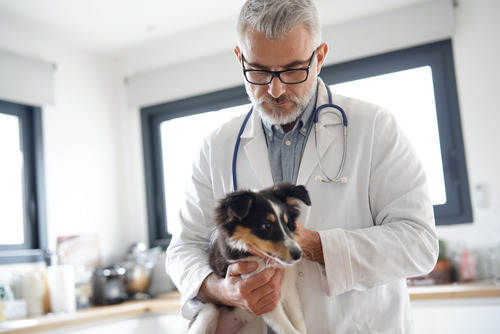Brucellosis in dogs is a bacterial infection that can have serious implications for your pet’s health. This contagious disease is caused by the Brucella bacteria and can affect dogs of all ages. Understanding the symptoms of brucellosis in dogs is crucial for early detection and effective treatment. In this blog, we will explore the signs and symptoms of this condition, how it spreads, and what you should do if you suspect your dog may be infected. For any concerns, contact Chimacum Valley Veterinary Hospital at (360) 385-4488 or request an appointment online.
What is Brucellosis in Dogs?
Brucellosis is an infectious disease caused by the Brucella bacteria, specifically Brucella canis in dogs. This condition is primarily a reproductive disease, but it can affect other systems in the body as well. The bacteria can spread through direct contact with infected animals or through contaminated materials such as bedding or food. Early diagnosis is essential to manage and treat brucellosis effectively, as it can lead to severe health issues in dogs and even cause infertility.
Transmission of Brucellosis
Brucellosis is highly contagious among dogs. The bacteria are typically transmitted through direct contact with bodily fluids such as urine, saliva, or reproductive fluids. Dogs can also contract the disease by ingesting contaminated food or water. Pregnant dogs can transmit the infection to their puppies during birth or through their milk. In kennels or breeding facilities, the spread of brucellosis can be rapid and widespread, making it crucial to maintain strict hygiene and testing protocols.
Common Symptoms of Brucellosis in Dogs
Brucellosis in dogs can present a variety of symptoms, many of which are related to the reproductive system. However, the bacteria can also affect other parts of the body, leading to a wide range of clinical signs.
Reproductive Issues
One of the most notable symptoms of brucellosis in dogs is reproductive problems. Infected male dogs may experience swollen testicles, inflammation of the prostate, and decreased fertility. Female dogs may suffer from miscarriages, stillbirths, or the birth of weak puppies. Repeated breeding failures can also be a sign of brucellosis in dogs.
Musculoskeletal Pain
Brucellosis can cause significant musculoskeletal pain in dogs. This can manifest as lameness, back pain, or difficulty walking. The bacteria can infect the joints, leading to arthritis-like symptoms and chronic discomfort. If your dog shows signs of unexplained pain or reluctance to move, it is essential to consider brucellosis as a potential cause.
Fever and Lethargy
Dogs with brucellosis often exhibit general signs of illness, such as fever and lethargy. These symptoms can be indicative of many diseases, so it is important to look for additional signs that might point to brucellosis. Persistent fever and a noticeable decrease in activity or interest in usual activities can be red flags.
Enlarged Lymph Nodes
Another symptom of brucellosis in dogs is the enlargement of lymph nodes. This can occur in various parts of the body and may be accompanied by swelling and tenderness. Enlarged lymph nodes are a sign that the body is fighting an infection and should prompt further investigation by a veterinarian.
Eye Infections
Brucellosis can also cause eye infections in dogs, leading to symptoms such as redness, discharge, and cloudiness in the eyes. These infections can be painful and may result in vision problems if not treated promptly. Eye infections should always be evaluated by a veterinarian to determine the underlying cause.
Diagnosing Brucellosis in Dogs
Diagnosing brucellosis in dogs involves a combination of clinical evaluation and laboratory testing. If your dog shows any of the symptoms mentioned above, it is crucial to seek veterinary care immediately.
Veterinary Examination
Your veterinarian will begin with a thorough physical examination of your dog, looking for signs of infection and discomfort. They will ask about your dog’s medical history and any recent exposure to other animals or potential sources of infection.
Laboratory Tests
To confirm a diagnosis of brucellosis, your veterinarian will likely recommend several laboratory tests. These may include blood tests, urine tests, and cultures of bodily fluids to detect the presence of Brucella bacteria. Advanced diagnostic tools such as PCR (polymerase chain reaction) tests can provide more accurate results and help identify the specific strain of bacteria.
Treatment and Management of Brucellosis in Dogs
Once brucellosis in dogs is diagnosed, a treatment plan can be developed. While brucellosis is a challenging disease to treat, early intervention can improve outcomes and help manage symptoms.
Antibiotic Therapy
The primary treatment for brucellosis in dogs is antibiotic therapy. Your veterinarian will prescribe a course of antibiotics to combat the infection. It is crucial to follow the treatment plan closely and complete the full course of antibiotics to ensure the bacteria are effectively eliminated.
Supportive Care
In addition to antibiotics, supportive care may be necessary to manage symptoms and improve your dog’s quality of life. This can include pain management for musculoskeletal pain, anti-inflammatory medications, and other supportive measures as needed.
Preventing the Spread of Brucellosis
Preventing the spread of brucellosis in dogs involves taking several proactive steps. Regular veterinary check-ups, proper hygiene, and responsible breeding practices can help reduce the risk of infection.
- Regular Testing: Regular testing for brucellosis is essential, especially for dogs in breeding programs or those that have been in contact with infected animals. Early detection can help prevent the spread of the disease and protect other animals in your household or breeding facility.
- Isolation and Quarantine: If your dog is diagnosed with brucellosis, it is crucial to isolate them from other animals to prevent transmission. Quarantine measures should be implemented to limit the spread of the bacteria. This includes keeping your dog away from communal areas and practicing strict hygiene when handling your pet.
Contact Chimacum Valley Veterinary Hospital for Assistance
Understanding the symptoms of brucellosis in dogs is the first step in protecting your pet’s health. If you suspect your dog may have brucellosis or if you have any concerns about their health, contact Chimacum Valley Veterinary Hospital at (360) 385-4488 or request an appointment online. Early diagnosis and treatment are essential to managing this serious condition and ensuring your dog’s well-being.





